When it comes to filmmakers William Castle will never be regarded as one of the best because even though his producing credits include the classic horror film Rosemary’s Baby he’s mostly known for low budgeted B-movies that relied on a variety of goofy gimmicks, such as “Emergo” a skeleton on wires that floated over the audience or the ever-popular “Percepto” which consisted of buzzers rigged to theatre seats, and then there was "Illusion-O" which allowed viewers to choose whether or not if they would see the terrifying 13 Ghosts of this movie’s title.
The basic premise of 13 Ghosts wasn’t anything audiences hadn't seen many times before, a small group of people arriving at a haunted house wherein ghostly hijinks quickly ensue, and William Castle himself had visited that trope a mere year earlier with House on Haunted Hill, where guests had to stay the night in an allegedly haunted house to win $10,000 dollars, and with 13 Ghosts we get a somewhat similar monetary incentive, only in this case, it has to do with an impoverished family who inherits a haunted house and have no real fiscal option but to stay put and deal with the spooky shenanigans as best they can. The patriarch of this film is Cyrus Zorba (Donald Woods), a cash strapped professor of paleontology who has three mortgages on his home and debt collectors repossessing his furniture, who learns of an inheritance from his rich uncle Dr. Plato Zorba, an expert in the occult who spent his life hunting and capturing ghosts as well as developing special glasses that would allow one to see spectral figures. At first this inheritance looks like a well-timed miracle, one that will solve all Cyrus's problems, unfortunately, there is no cash windfall just a large and spooky house that is loaded to the rafters with phantoms.
Note: A William Castle budget is not going to provide viewers with especially convincing ghosts and the ones in this movie would be hard-pressed to pass muster at your average carnival’s House of Horrors.
The Zorba family consists of not only daddy dumbass but also his much-beleaguered wife Hilda (Rosemary DeCamp), who isn’t too keen on poltergeist activity in her kitchen, then there is their beautiful older daughter Medea (Jo Morrow ), who could provide the film with a love interest if the plot didn't fail her there big time in that department, and finally, we have their 12-year old son Buck (Charles Herbert), a kid who is quite excited by the prospect of rooming with ghosts. Now, one of the trickiest bits of writing a proper ghost story is in coming up with a reason for the family not immediately packing up and leaving the minute ghosts start chucking meat cleavers at their collective heads. Well, it turns out that Plato Zorba’s will states that if they move out of the house ownership transfers to the state and they will get nothing, so good ole Cyrus tries to put on a brave face for as long as he can.
How brave one looks while wearing “Ghost Viewers” is up for debate.
This leads to one of my favourite scenes in this movie, where Buck finds a Ouija board hidden behind a secret panel and the whole family decides to play. They start out asking your basic questions, such as "Will Medea find love" but when Bucks asks how many ghosts are in the house and, “Are they going to kill any of us?” the planchette floats over to Medea and then drops into her lap. Medea’s bizarre reaction is to state, “Don’t ask it when. I don’t want to know” but what is even more bizarre than her rather blasé attitude to an impending doom is that we cut to the parents getting ready for bed and not them packing the family car and getting the hell out of there.
“Honey, it was probably swamp gas.”
Unfortunately, there is more going on than a baker’s dozen of randy spirits as we also have the mystery involving Plato Zorba’s fortune. Despite the fact that Plato Zorba’s lawyer, Benjamen Rush (Martin Milner), assured the family that their deceased uncle had spent all his fortune-hunting ghosts good ole Buck accidentally comes across another hidden compartment, one containing thousands of dollars. This seemingly charming lawyer, and possible suitor for Medea’s love, convinces Buck to keep this “hidden treasure” a secret and then proceeds to try and murder the kid in his sleep. Turns out Rush knew there was money hidden somewhere in the house all along and was doing his best to scare the Zorba family away so that he could search for it – at one point he dressed up as a walking corpse to scare Medea – but being there are actual ghosts in this house Martin soon meets his fate at the ghostly hands of Plato Zorba, who was murdered by the scummy lawyer via a bed with a canopy that would slowly smother the occupant.
The movie takes a right turn into Tales from the Crypt territory.
Stray Thoughts:
• Plato Zorba travelled the world collecting and capturing ghosts which is kind of the same premise behind Disney’s Haunted Mansion attraction.
• The house comes with a maid played by Margaret Hamilton, who is repeatedly referred to as looking like a witch, a cute nod to her role in The Wizard of Oz.
• When Buck asks the Ouija board “How many ghosts are there” he gets the answer 13, but at this time in the movie there were only twelve ghosts counting Uncle Plato, the thirteenth ghost wouldn’t exist until after the lawyer is killed at the end of the movie, so does this mean the board has a precognitive setting?
• Cyrus discovers the hidden switch that puts the canopy bed into murder mode but he doesn’t think about dismantling such a dangerous device.
• The place the family inherits is in reality the Winchester Mystery House located in San Jose California.
I’m betting both the Munsters and the Addams Family live next door.
There are no real scares to be found within the 82 minutes of William Castle’s 13 Ghosts because despite their numbers these ghosts are neither convincing nor terrifying, and the effects used to bring them to “life” are bargain basement at best. What Castle relied on to bring in the crowds was the gimmick du jour and in this case it was something he called "Illusion-O" where audience members would be given a pair of their very own “Ghost Viewers” that gave them the choice of whether or not to see the spooks. Chose to look through the red filter and see the ghosts or through the blue filter and be spared their frightening visage. This, of course, was a rather silly gimmick as what audience member was going to choose not to see the ghosts they’d paid their two bits to see?
Mind you, even looking through the proper filter you could barely see the ghosts.
That all said, William Castle’s 13 Ghosts is still a rather fun outing and a film I can recommend to any fan of the genre, and as a ghost story, it’s one that can be shared with even the youngest of viewers as it is more goofy than scary. The cast on hand all provide solid performances and I especially enjoyed seeing Martin Milner playing against type as the murdering lawyer. 13 Ghosts may not give anyone nightmares but the level of charm and the good-natured silliness of the ghosts makes this film a delightful supernatural romp.
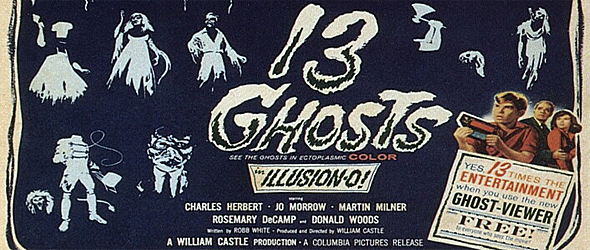
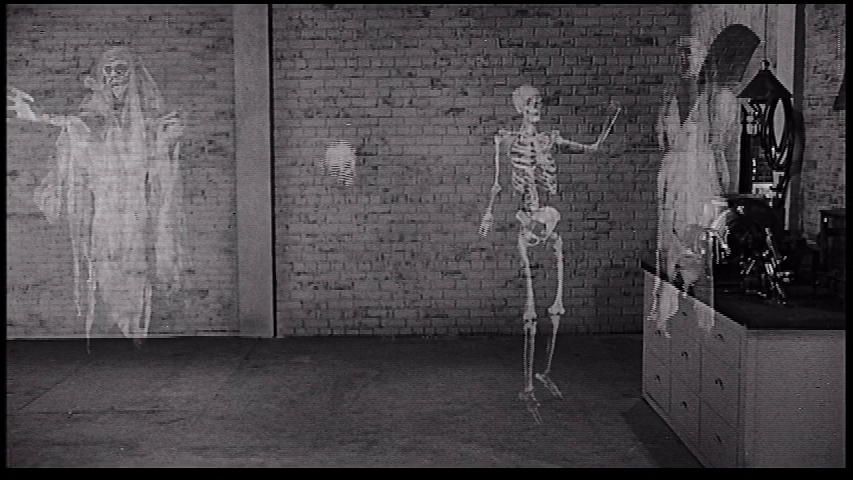
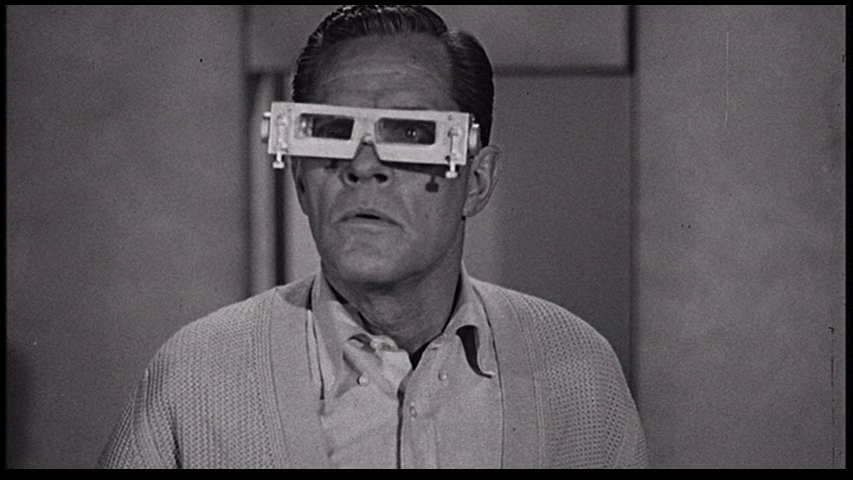
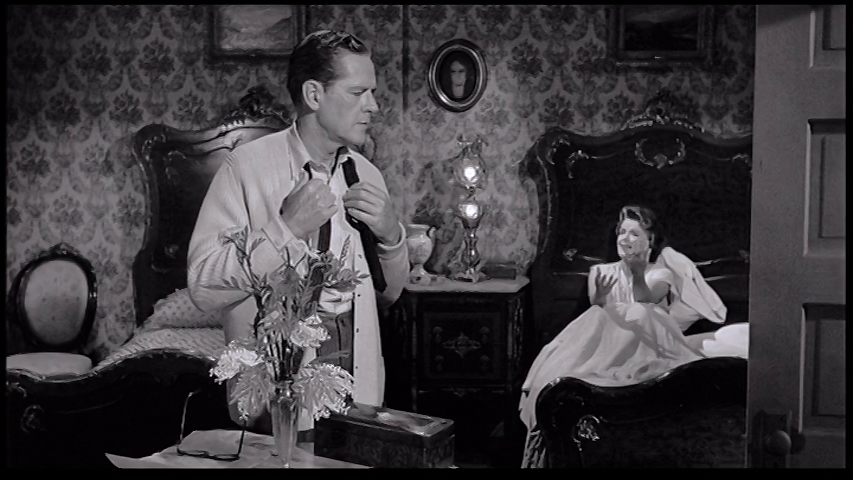
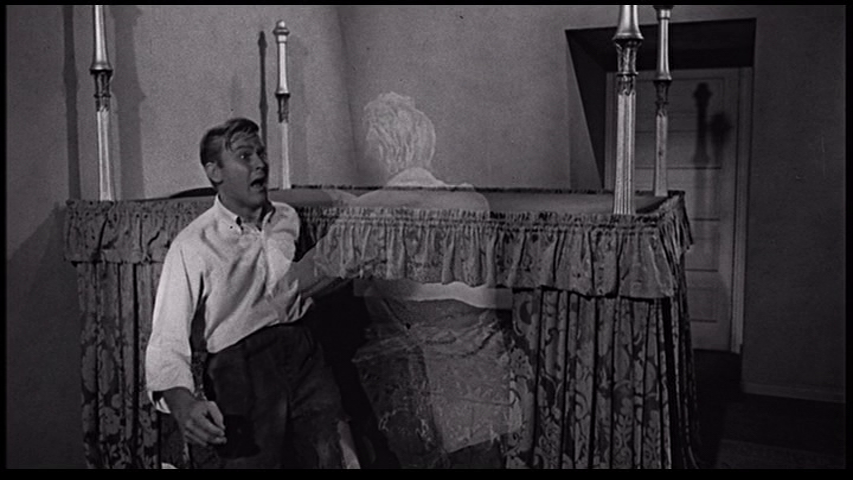
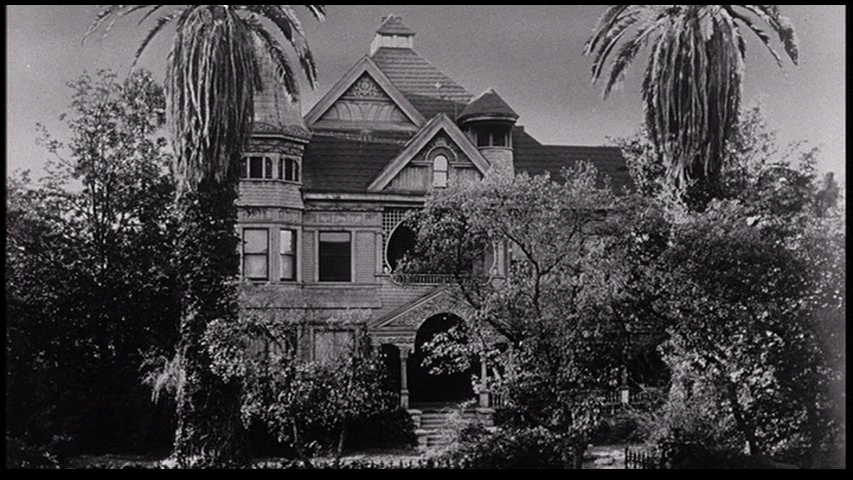
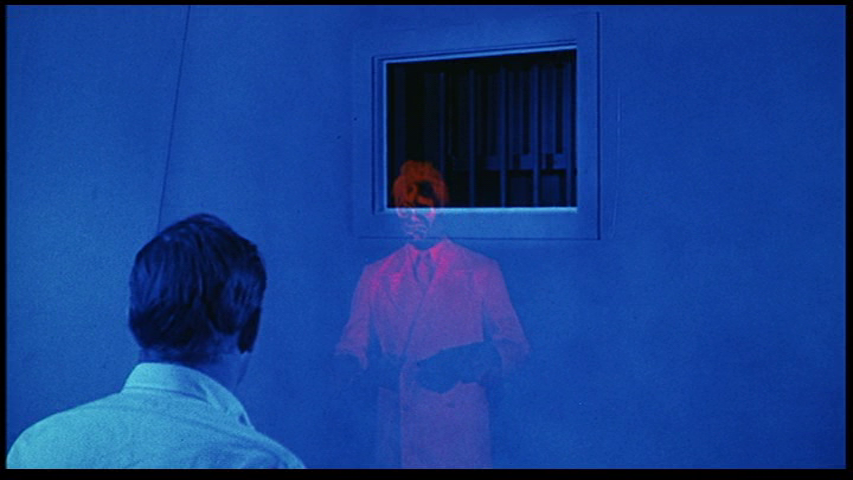

No comments:
Post a Comment